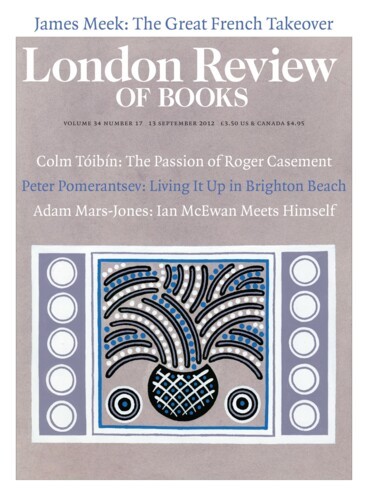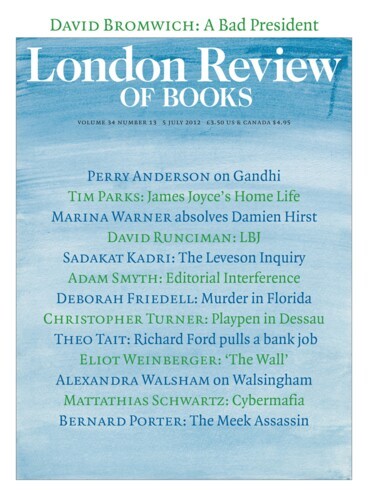American political campaigns rely on what insiders call the ‘narrative’, though, like a Hollywood sales pitch, it’s a story that’s never more than a sentence long. One of the problems the Republicans have had this year is that they have three contradictory narratives for Obama. There is Obama in the dashiki: the Kenyan Muslim Socialist who ‘hates America’ (as Rush Limbaugh often says) and wants to turn the country into some sort of jihadi North Korea. There is Obama in the hoodie: the ruthless, corrupt gangsta, ‘Chicago-style sleaze’ (as John McCain said recently). And then there is the barefoot Obama, shirtless in ill-fitting overalls: an amiable but bumbling clown, ‘lazy’ and ‘not that bright’ (as Romney’s spokesman John Sununu said after the debate) who’s in over his head trying to run a government. Unfortunately for the Republicans, the images of Obama as simultaneously the blackface Scarface, Chairman Mao and Stepin Fetchit tend both to cancel each other out and bear no resemblance to the articulate, unflappable, professorial type and his seemingly perfect all-American, however unwhite, family.
Eliot Weinberger
Eliot Weinberger’s first book of essays, Works on Paper, was published in 1986. Nineteen Ways of Looking at Wang Wei: How a Chinese Poem Is Translated came out the following year. He has translated the work of Octavio Paz, Jorge Luis Borges and others from Spanish. ‘What I Heard about Iraq’ was published in the LRB of 3 February 2005 and soon afterwards as a short book by Verso. Angels and Saints came out in 2020. His most recent book is The Life of Tu Fu, a fictional autobiography of the Tang Dynasty poet.
Mouse Mouth Mitt
Eliot Weinberger, 13 September 2012
The one interesting thing about Mitt Romney is his nearly pathological absence of political savvy. Has there ever been a national candidate who has managed to alienate or outright insult so many potential voters? The tiny pebbles of cruel or clueless Mittisms – mocking the cookies some elderly women supporters baked for him and the cheap rain ponchos of Nascar fans; the delight in...
A Hologram for President
Eliot Weinberger, 30 August 2012
Poor Mitt. He became the Republican candidate for president by default, as the least worst choice from a pack of bizarre characters seemingly drawn from reality TV shows or Thomas Pynchon novels, but he’s not finding much love, even at his own coronation. Only 27 per cent of Americans think that he’s a ‘likeable’ guy. (Obama gets 61 per cent.) On television he projects a strange combination of self-satisfaction and an uneasiness about dealing with others who might doubt his unerring rectitude. The only well-known anecdotes about his bland life of acquiring wealth are both cruel: leading a pack of bullies at his prep school, personally cutting off the long hair of a weeping and pleading gay student, and putting the family dog in a box on the roof of his car for a twelve-hour drive to Canada.
Poem: ‘The Wall’
Eliot Weinberger, 5 July 2012
I.
At 8.46 p.m. at Rudower Höhe, the sentry sneezed and a West Berlin customs officer shouted back: ‘Gesundheit!’
At 11.40 a.m. at the Kiesberg sentry post, three West Berlin youths shouted: ‘Hey, guys, still smoking rags? Want an HB cigarette? Come over and get one.’
At 9.25 a.m. at the Buckersberg sentry post, two men, aged thirty-five to forty, asked:...
In 2010, the Israeli novelist Nir Baram caused a small scandal at the International Writers’ Festival in Jerusalem by daring to point out that 'we are witness to the systematic violation of the rights of non-Jews in the State of Israel and the Occupied Territories.' Festival director Tal Kremer told Haaretz that 'in the end, his speech did no harm,' and she frequently cites it to persuade pro-Palestinian writers to attend. 'I don't think my job is to put up barriers and engage in censorship,' she said. However, 'in light of what happened with Nir Baram' – which she calls 'a production error on our part' – 'we asked this year's authors to give us the text of their speeches' in advance.
Pieces about Eliot Weinberger in the LRB
Name the days: Holy Spirits
Marina Warner, 4 February 2021
The strangeness of such religious material again and again makes it incomprehensible that such figures should be considered holy, but if you look instead at their adventures as a remedy for the drudgery,...
Real isn’t real: Octavio Paz
Michael Wood, 4 July 2013
In 1950 André Breton published a prose poem by Octavio Paz in a surrealist anthology. He thought one line in the work was rather weak and asked Paz to remove it. Paz agreed about the line...
Spanish Practices
Edwin Williamson, 18 May 1989
Octavio Paz occupies a unique position in the Spanish-speaking world. He is the foremost living poet of the language as well as being one of the most authoritative interpreters of the Hispanic...
Goodbye to Borges
John Sturrock, 7 August 1986
Borges died on 14 June, in Geneva – which bare fact virtually calls for an ‘English papers please copy,’ as they used to say, so complacently scant and grudging were the notices...
Read anywhere with the London Review of Books app, available now from the App Store for Apple devices, Google Play for Android devices and Amazon for your Kindle Fire.
Sign up to our newsletter
For highlights from the latest issue, our archive and the blog, as well as news, events and exclusive promotions.




